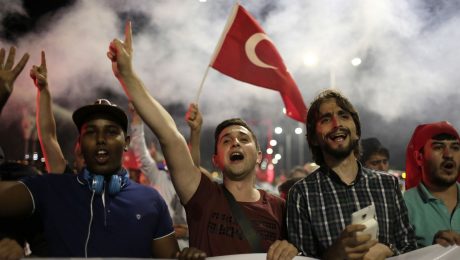Keyword: Freedoms

Turkey’s president is using the failed coup as an excuse to snuff out secular democracy
In the immediate aftermath of the Turkish military’s attempted coup on July 15, the international community responded with relief. While many people within Turkey and outside of it are no fans of Recep Tayyip Erdogan’s authoritarian regime, the bloodshed and chaos that would have resulted from a government overthrow seemed like the worse of two options.

Turkey Coup: Erdogan Uses Stalinist Measures To Crack Down On Education
In rhetoric reminiscent of the Stalinist purges, Erdoğan promised to “cleanse all state institutions”, rid Turkey’s judiciary of “cancer cells” and purge state bodies of the “virus”that has spread throughout Turkish state structures.

Turkey Faces Its Iran 1979 Moment
Turkey is at a pivotal point in its history following the failed coup attempt of July 15. President Recep Tayyip Erdogan, having survived the coup plot, won fresh legitimacy and gained a new ally: religious fervor in the streets. Mr. Erdogan can use this impetus either to become an executive-style president, or he can encourage the forces of religion to take over the country, crowning himself as an Islamic leader.

Turkey: Time the world intervened
In composing his famous tripartite epic poem, The Divine Comedy, Dante Alighieri included in the first part called Inferno, what has since become one of the most meaningful quotes of all time, emphasising that “the hottest places in hell are reserved for those who in times of moral crisis preserve their neutrality.” The quote was made more popular by late American President J.F. Kennedy, who aptly used it very often in 50s and 60s.

AFSV Condemns Erdoğan’s Persecution of the Hizmet Movement
The push by Turkish President Recep Tayyip Erdogan for the Prime Minister’s cabinet to designate the Hizmet movement — also known as the “Gülen movement” — as a terrorist organization only serves to further Erdoğan’s crackdown on dissent, civil society and the media.

A Mother and Son Flee Istanbul for San Antonio
Before the live feed was cut from the Zaman building on that Friday in March, I watched police shoot rubber bullets into the crowd gathered to protest the paper’s seizure. Bloodied, the crowd retreated, still screaming for free speech but knowing hope was gone.

Erdogan’s vendetta against moderate Muslims threatens Turkey’s role in War on Terror
This blatant display of force demonstrates how far Turkey’s increasingly autocratic President Recep Tayyip Erdogan will go to solidify his power and pursue his vendetta against the adversary he fears most: the moderate Muslim cleric Fethullah Gulen, whose columns were published by Zaman.

Sweep these [journalists] off the floor
Sevgi Akarçeşme, former editor in chief of Today’s Zaman, recalls the night when the police raided the building of the most important and independent opposition newspaper in Turkey. «What happened to journalists today» she warns « can happen to citizens tomorrow».

Turkic American Alliance Condemns Government Takeover of Zaman
Turkish government seized control of Zaman Newspaper, the largest and highly circulated newspaper in Turkey. The takeover is a violation of the freedom of press which is vital for every democratic state and requires political intervention from the international community.

Zaman newspaper: Turkey police raid press offices in Istanbul
Turkish police have raided the offices of Zaman, the country’s biggest newspaper, hours after a court ruling placed it under state control. Police entered the building in Istanbul late on Friday, firing tear gas at protesters who had gathered outside. Zaman is closely linked to the Hizmet movement of influential US-based cleric Fethullah Gulen. Turkey […]

AFSV Denounces President Erdogan’s Seizure of Leading Newspaper Zaman
The Turkish government’s seizure of Zaman, the largest-selling newspaper in Turkey, is an attack on the country’s human rights, civil society and freedom of expression and the media. In his effort to consolidate power and silence all dissent, president Recep Tayyip Erdoğan’s actions only serve to highlight his growing authoritarian tendencies.

Gülen’s speech broadcast live for first time after website banned
A speech by Turkish Islamic scholar Fethullah Gülen, who lives in Pennsylvania in self-imposed exile, was broadcast live on YouTube and a number of stations for the first time on Sunday, after Turkey’s state-controlled Internet watchdog blocked access to herkul.org, a website that previously was used to broadcast his speeches.

Gülen’s lawyer: Views other than state ideology considered a crime in Turkey
Nurullah Albayrak, the lawyer of prominent Turkish Islamic scholar Fethullah Gülen, has criticized the blocking of herkul.org, a website that regularly broadcasts speeches by Gülen, saying views that are different from the state ideology are considered a crime in Turkey today.



















